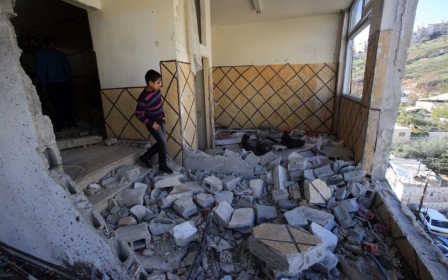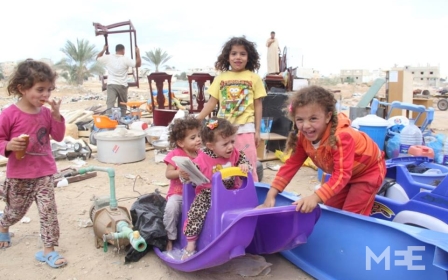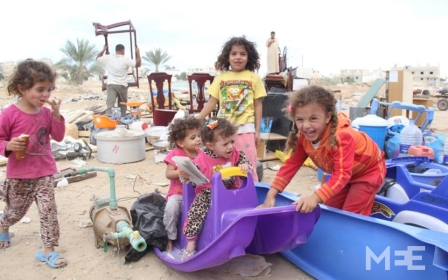Poor Israelis also feel wrath of state's demolitions

In 1948, the 1,250 Palestinian residents of the village of Jamusin left their homes and their land because of the danger and the threat of violence.
At the same time another community, this time of Jews, was evacuated from the border neighbourhoods of Jaffa and Tel Aviv for similar reasons. They too were in danger from the growing violence that was encircling their neighbourhood.
The Jewish families were brought to the empty homes of Jamusin. The Palestinians became refugees. With the change of residents, the village received a new name: Givat Amal (Hill of Labour).
The Jews were told that they were helping with the war effort by staying in the Palestinians' homes. As the years went by, they found themselves trapped in limbo. They never received a proper lease on their homes and, as the land became more valuable, they were soon regarded as trespassers and land grabbers.
It happens in many countries. The rich and powerful take advantage of the poor and powerless for greed and money, all in the name of development and progress. For that to happen in a democratic country, there must be close ties between the government, the courts and the business sector. Is that the story here too? Yes, but it’s not the whole story.
In September 2014, the Israeli police evicted the Jewish families from Givat Amal. The police got their orders from the courts which ruled that only the first generation of residents - those who were there in the early 50’s - will be compensated. The courts regarded their children and grandchildren as trespassers, with the investors who are building on the land now actively campaigning to portray the residents as greedy land grabbers. The government simply abandoned the residents, selling them out, along with the land, to the investors.
The Jewish families who live in Givat Amal came from Arab countries. They were not an organised group and they were not close to any political power. In 1949, many immigrants came to the newly established state and there was a shortage of housing. There was also a conscious effort not to allow the Palestinians to come back to their homes. For these two reasons, immigrants were given empty Palestinian homes in different towns and cities. Givat Amal was part of a systematic pattern.
The narrative of these Jewish families is that they were brought there by the government as part of the Zionist effort to gain a hold of the land. Today in Tel Aviv’s Jaffa (as well as in Jerusalem) their neighbourhoods have become very expensive. There are plans to destroy the small run-down homes and build high-rise apartments in their place - as has already happened in other parts of Israel. The families of Givat Amal knew what was coming and had no illusions about keeping their homes. The battle is instead over compensation and dignity.
We have seen this pattern before. Jewish people who have lived in homes for over 60 years and have done so with the backing of the state received eviction notices and overnight became trespassers. One way to look at it is that these were not their homes to begin with, so justice is not an issue here. But most Jews in Israel believe that these people desperately needed a roof over their heads, and think that these things happen during war and that therefore the families did nothing unlawful.
On 4 November, 2014 an investigative documentary programme on the evictions was aired on Israel's Channel 10. The programme was sympathetic with the residents and critical of the police which closed the area to the press and evicted the residents by force. The programme was also critical of the greed and insensitivity of the investors who bought the land from the state.
Many issues were missing from the report. Naturally, prime time TV must simplify stories and create drama. For example, there was little mention of the pattern of privatisation. The municipality and the state gave up their responsibility for the residents, sold the land for a quarter of what it was worth, with an understanding that the new owners would do the dirty work of evicting and compensating the residents. Another issue that was missing was the historical context. In the 57-minute programme, the Palestinians were vaguely alluded to in only three words: “…The first residents were brought to the abandoned village of Jamusin….” That is all.
When the 1,250 Palestinians of Jamusin left in 1948, there was no television crew to document their exodus. There was no press to remind the public that they left out of fear from attacks by the Jewish forces and that they had been promised that they could return after the war. Jamusin was a community of Muslims who settled in the area in the 18th century. They came from Egypt. They were farmers and buffalo herders who sold meat, milk and farm produce to the people of Jaffa. Today their descendants largely live in refugee camps near Nablus.
The State of Israel, through its courts, has been consistently unfair to weak populations; in this case by not allowing the Palestinian refugees to return, followed by the declaration that their homes and lands were “abandoned property.” The pattern continued with the Jews who were asked to settle in the “abandoned property,” only to be labelled as trespassers sixty years later.
On television, the eviction looked like a scene from a military zone. One woman said to the cameras: “We do not have the ability to resist so many policemen.” An old man who grew up in Gival Amal cried and asked: “…. How could the state take me to court? I raised my children to be soldiers.”
Among most Jewish Israelis, raising children to be soldiers is the highest form of citizenship and loyalty. You sacrifice for the state and you do so willingly, feeling that the state will take care of you and give you protection and respect. This social contract has been broken. Once again.
How do we know that it has been broken? Because not everyone who received “abandoned” property has been labelled a trespasser. In other parts of Tel Aviv (and Jerusalem), strong social groups like military people, academics, medical professionals as well as municipality and civil servants also received homes and land in the “abandoned areas,” but in their cases, there were no evictions; the residents were able to register their property under their names, which means they could pass it on to their children.
The further you were from power, the greyer your arrangements became. Most of the poor, unorganised (mostly Mizrahi) immigrants did not receive the proper documents. Those who did receive papers acknowledging their ownership, did not receive the coordinates that specify the borders of their plots.
Until today, their neighbourhoods are in constant tension and conflict over property boundaries. Their neighbourhoods remained underdeveloped as if time (and the municipality) stood still. So there is a vicious circle. The neighbourhoods of the poor are underdeveloped, with residents fighting among themselves. This allows the investors and the municipalities to take matters in their own hands in the name of progress and development. And of course, the whiter you are, the better off you are. Most of the residents who did not get a chance to own their homes were Jews from Muslim countries.
The work of an archaeologist is required to expose the layers and interconnections of Israeli society. When I began to dig, I thought I was writing about places with which I had no connection. I had never been to Givat Amal and I do not know anyone who lives there. Then I looked more closely at the maps:
When I was in high school (many years ago) I used to sit by the window in class and look out at the buildings and the road. I now see that I was looking at the run-down houses of Givat Amal - Jamusin. I was never told who lived there and I never asked. I did not even know that some of the students in my school lived there. Now that I am writing about Givat Amal-Jamusin, I see again how history is edited with one finger on the delete button.
This liberal school that taught me so many humanistic values, failed to mention that it was built on “abandoned land.”
It would be too much to expect from the school to give the land it received back to its original owners. It is the State’s responsibility to reach a solution to the conflict. But looking back, I wonder what would have happened had we been taught the story of the land, the landscape and the people: the Palestinians who were no longer there, but only an hour away, and the Mizrahi Jews who were still there - two communities which had been wronged by the same system. And behind the system there were just people.
My high school is proud to show that leaders, politicians, judges and artists are among its graduates. These are the elites who profit from those unspoken historical arrangements. How ironic that one of the judges who decided that the second and third generations of Givat Amal cannot inherit their parents’ homes is a graduate of that school.
Not only did she graduate from that school, but today she lives in one of the apartments that were built on the stolen lands of Jamusin. I wonder if it occurred to her to disqualify herself from presiding over this particular case. I am guessing that she thought she was professional, neutral and fair. People with privileges tend to see them as natural and sometimes not see them at all.
I wanted to write about the tragedy of Givat Amal. At first I thought it was a story of two groups of Jews who were fighting over Palestinian land. Reuven Aberjil, a long-time freedom fighter told me that this was not the story here: “We don't have two equal Jewish groups fighting for the better business deal. What we have here is a systemic abuse of power. The Palestinians and the Mizrahi Jews are victims of the same group.”
New MEE newsletter: Jerusalem Dispatch
Sign up to get the latest insights and analysis on Israel-Palestine, alongside Turkey Unpacked and other MEE newsletters
Middle East Eye delivers independent and unrivalled coverage and analysis of the Middle East, North Africa and beyond. To learn more about republishing this content and the associated fees, please fill out this form. More about MEE can be found here.





